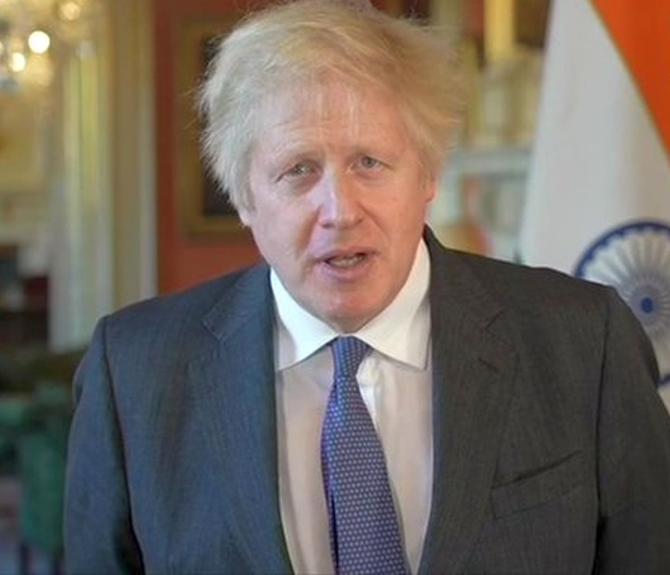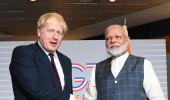British Prime Minister Boris Johnson has cancelled his planned visit to India next week due to the coronavirus situation there, Downing Street announced on Monday, the day it was also confirmed that the country has been added to the United Kingdom's COVID-19 travel ban "red list".

Johnson, who admitted it was “frustrating” but “only sensible” to call off the visit, will instead speak to Prime Minister Narendra Modi later this month to launch their plans for the future UK-India partnership, with their physical meeting expected later in the year.
"Narendra Modi and I have basically come to the conclusion that, very sadly, I won't be able to go ahead with the trip,” Johnson told reporters, during a visit to Gloucestershire soon after the Downing Street announcement.
"I do think it's only sensible to postpone, given what's happened in India, the shape of the pandemic there. Countries around the world including our own have been through this – I think everybody's got a massive amount of sympathy with India, what they're going through," he said.
Asked if India would be added to the “red list” of countries, which imposes an effective travel ban and compulsory 10-day hotel quarantine for any returning UK and Irish residents, the Johnson said that was “very much a matter for the independent UK Health Security Agency – they will have to take that decision".
That decision came soon after as UK Health Secretary Matt Hancock told MPs in the House of Commons that effective 4am local time on Friday, there will be travel ban in place for India and any returning British residents must complete a 10-day hotel quarantine in order to track and trace a new variant of coronavirus first detected in India.
"We've been analysing samples from these cases to see if this variant has any concerning characteristics – like greater transmissibility or resistance to treatments and vaccines – meaning it has to be treated as a variant of concern. After studying the data and on a precautionary basis, we've made the difficult but vital decision to add India to the red list," Hancock said.
"India is a country I know well and love. Between our two countries we have ties of friendship and family. I understand the impact of this decision, but I hope the House will concur we must act because we must protect the progress we have made in this country in tackling this awful disease," he added.
The minister confirmed that 103 cases of the Indian variant, of which the "vast majority have links to international travel", have been detected in the UK so far.
“In the light of the current coronavirus situation, Prime Minister Boris Johnson will not be able to travel to India next week,” Downing Street said in a joint statement on behalf of the British and Indian governments earlier.
“Instead, Prime Ministers Modi and Johnson will speak later this month to agree and launch their ambitious plans for the future partnership between the UK and India. They will remain in regular contact beyond this, and look forward to meeting in person later this year,” the statement said.
The Ministry of External Affairs in New Delhi said the decision followed a mutual agreement and that the two leaders will hold a virtual meeting in the coming days instead.
“The two sides will be holding a virtual meeting in the coming days to launch plans for a transformed India-U.K. relationship. Both leaders attach the highest importance to taking the India-U.K. partnership to its fullest potential and propose to remain in close touch in this regard and look forward to an in-person meeting later in the year,” the MEA official spokesperson said.
Johnson, 56, spent days in hospital after he tested positive for Covid-19 at the peak of the UK's first wave of the pandemic in March-April 2020 and recently announced he had received his first dose of the Oxford/AstraZeneca vaccine.
Over the weekend, UK Opposition Labour Party joined calls for Boris Johnson to conduct the discussions with the Indian Prime Minister remotely via Zoom and cancel the physical visit, which had already been shortened to focus on a day-long packed schedule on Monday, April 26.
Both sides were to agree a ‘Roadmap 2030' for re-energised India-UK relations across trade and investment and climate action, which is now likely to be signed off remotely later this month.
The visit, previously postponed from a Republic Day tour in January due to a spike in coronavirus infections and national lockdown in Britain at the time, was to be the first major bilateral visit for Johnson outside Europe since the UK general election in December 2019 and the conclusion of the Brexit transition period at the end of December 2020.
As part of the UK's post-Brexit Global Britain engagement as a non-member of the European Union, all eyes have been on a proposed Enhanced Trade Partnership with India which will pave the way for a full-fledged Free Trade Agreement in the future.
The ETP was expected to take firm shape during Johnson's visit this month but it remains to be seen how that progresses given the cancellation.
Prime Minister Modi is invited to the G7 Summit in Cornwall in June, with India among the guest countries. That is now likely to be their next face to face meeting, if Modi is able to travel for the summit and the event goes ahead as planned between June 11 and 13.











 © 2025
© 2025